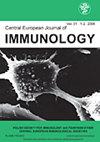Influence of blood sample storage and different types of anticoagulants on results of NK cytotoxicity tests
IF 1.6
4区 医学
Q4 IMMUNOLOGY
引用次数: 0
Abstract
Introduction:Natural killer (NK) cells are important players in the human immune response. Impaired NK function may lead to serious, life-threatening conditions. Defects may be consequences of genetic mutations or results of secondary factors such as infections, malignancies and autoimmune diseases. The cytotoxicity test is very useful, but its accessibility is limited to special immunological laboratories. Blood samples are often transported to remote centers, which takes time and requires special conditions. The aim of this study was to compare cytotoxicity assay results between samples preserved with three different anticoagulants to standardize the diagnostic procedure.
Material and methods:
Peripheral blood from healthy donors was taken with three anticoagulants: heparin, K2EDTA and citrate. Peripheral blood mononuclear cells (PBMC) were isolated and tested directly after blood drawing and after 24-hour storage. Cytotoxic abilities of NK cells were tested in 4 h co-culture with K562. NK cytotoxicity was measured by flow cytometry.
Results:
In most cases of analyzed healthy donors, cytotoxicity results were similar regardless of type of anticoagulant. However, the highest mean values were obtained in samples with citrate. There was a significant decrease in cytotoxicity after 24 hours of storage of the whole blood at ambient temperature. The mean drop in cytotoxicity results was substantial for all anticoagulants: 76% for heparin, 67% for citrate and 70% for EDTA.
Conclusions:
Results of spontaneous NK cytotoxicity seem to be affected by the anticoagulants used for blood protection. Commercial instant cytotoxicity testing and delayed analysis after blood storage gave the highest results in blood with sodium citrate.
血样储存和不同类型抗凝剂对 NK 细胞毒性测试结果的影响
导言:自然杀伤(NK)细胞是人体免疫反应中的重要角色。NK 功能受损可能导致严重的危及生命的疾病。缺陷可能是基因突变的结果,也可能是感染、恶性肿瘤和自身免疫性疾病等继发因素的结果。细胞毒性检测非常有用,但仅限于专门的免疫实验室才能使用。血液样本通常要运送到偏远的中心,这需要时间和特殊条件。本研究的目的是比较用三种不同抗凝剂保存的样本的细胞毒性检测结果,以规范诊断程序。抽血后直接分离外周血单核细胞(PBMC),并在储存 24 小时后进行检测。在与 K562 共培养 4 小时后测试 NK 细胞的细胞毒性能力。结果:在大多数被分析的健康献血者中,无论使用哪种抗凝剂,细胞毒性结果都相似。然而,枸橼酸盐样本的平均值最高。全血在环境温度下储存 24 小时后,细胞毒性明显降低。所有抗凝剂的细胞毒性结果平均值都大幅下降:结论:自发性 NK 细胞毒性结果似乎受到用于血液保护的抗凝剂的影响。商业即时细胞毒性测试和血液储存后的延迟分析在使用柠檬酸钠的血液中得到的结果最高。
本文章由计算机程序翻译,如有差异,请以英文原文为准。
求助全文
约1分钟内获得全文
求助全文
来源期刊

Central European Journal of Immunology
IMMUNOLOGY-
CiteScore
3.00
自引率
0.00%
发文量
17
审稿时长
6-12 weeks
期刊介绍:
Central European Journal of Immunology is a English-language quarterly aimed mainly at immunologists.
 求助内容:
求助内容: 应助结果提醒方式:
应助结果提醒方式:


